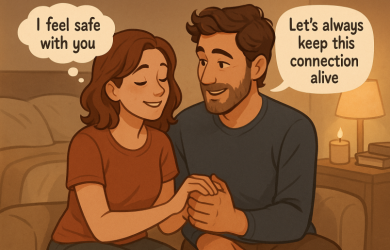How to Help a Partner With an Eating Disorder: 5 Ways

Unlock Daily 30-Sec Tips for a Happier Relationship
👉 Subscribe FREEKey Takeaways
Marriage.com AI Quick Summary
Are you feeling helpless as you watch your partner waste away because they won’t eat? The underlying causes behind any eating disorder are a range of complex and potentially life-threatening mental health issues. Nevertheless, people can and do recover with eating disorder help.
The struggle between eating disorders and romantic relationships
Eating disorders come in various forms as described by this eating disorder center’s overview of criteria. These range from restricting food intake to overeating food. The main point to note when reviewing eating disorder help is that it usually has very little to do with food.
“What’s an eating disorder” isn’t an easy question to answer. First, food usage is only a symptom. Secondly, the cause behind why someone has been driven to use food to manage their lives is complex.
Dating someone with an eating disorder isn’t easy. You might even feel that you’re speaking to a different person because the eating disorder has taken over. Communication becomes strained and distant. Moreover, the shame and guilt that sets in often destroy your sexual life and any intimacy.
-
Using food to manage crises
Essentially, when struggling with an eating disorder, people turn to food to de-stress or to give themselves a sense of control. Most of the time they’ll also deny they need any sort of eating disorder help.
As a therapist describes in her Q&A article on childhood attachment patterns and food, an eating disorder and relationships with food are more about filling a void. This hole is often created in childhood due to poor attachment but it amplifies during adult crises.
Nevertheless, the hole of despair and helplessness can be healed with eating disorder help.
Professional help involves exploring what happened in childhood and what hole exactly the person is trying to fill or numb with food. They’ll also explore other potential causes such as societal, cultural and personality traits. These could be, for example, high achiever mode, obsessive-compulsive, anxiety and many more.
-
Romantic partners – you are not alone
Deep down, eating disorder victims experience such deep shame and confusion that they often hide their eating habits. This has a major impact on those around them who care for them. You need to only look at the secrecy to understand how eating disorders affect relationships. Secrets drive people apart.
Many well-meaning partners and friends try to reassure their loved one by telling them that they need to eat and that their body looks fine. Whilst this can help in some cases, this usually drives people further away. Being persuaded to eat only creates mistrust and resentment.
How to get over an eating disorder takes more than just learning to appreciate our bodies. In fact, when it comes to eating disorder help, a professional looks at each person individually. The aim is to understand their specific life story and how this has driven them to feel lost and unable to manage life.
Romantic partners aren’t trained to take on such responsibility but you can support your loved one. In fact, this study shows that interpersonal experience with family and partners has a hugely positive impact on eating disorder recovery.
Nevertheless, inform yourself and get your own support to avoid getting caught up in emotions. It’s easy to fall into criticism and over-protectiveness when we’re anxious, as careers often are. So, reach out to your local eating disorder center to find the right people to talk to and to help you.
5 approaches to support your partner through an eating disorder
If you’re thinking to yourself “an eating disorder is ruining my relationship”, you might wonder what else you can do. As part of reaching out for eating disorder help, make sure you educate yourself as much as you can.
How to deal with an eating disorder means overcoming your own frustrations. Sometimes it helps to remember that eating disorders are often triggered by trauma and life stressors.
So, rather than focusing on fixing the problem, focus on holding a loving and nurturing space. This complements whatever eating disorder help they’re getting.
How to cope with eating disorders is a journey for both of you. Go through the following 5 points to give you some ideas of eating disorder recovery activities that could help you and your couple.
1. Don’t problem solve
One of your biggest challenges as the supporting partner is to try to avoid asking yourself “how to fix an eating disorder”. Our natural inclination is to resort to problem-solving but this often adds fuel to the eating disorder.
Try to imagine that problem-solving sounds like telling someone what to do. This further stresses the eating disorder victim because they get triggered and feel controlled. So far, their coping strategy is to control food so you’re pushing them into their unhealthy behaviors by stressing them.
As this study on disordered eating behaviors shows, beliefs of ineffectiveness and fear of losing control are two critical dimensions of eating disorders. So, instead of problem-solving, ensure that you accept your partner and their struggles without appearing to judge or criticize.
2. Create a nurturing space
Struggling with an eating disorder is like living with an inner demon. As psychotherapist Richard Schwarz describes in his Internal Family Systems therapy, your eating disorder is a misguided but well-meaning part of you.
As Schwarz describes in his article on the Larger Self, he worked with eating disorder patients who clearly had internal struggles with different parts within them. Over time, he developed an approach to allow those eating disorder parts to heal.
The idea behind the healing process is that everyone can do their own healing by connecting to what Schwarz calls the inner self. This self is compassionate and calm. We all have one but it takes a therapist to bring it out when our struggles are too great.
Dating someone with an eating disorder means that you can also emulate this inner self by leveraging your own core of compassion and calm. The more you can connect and be curious about your partner’s feelings, the more they’ll feel safe and open up.
Listen to Dr. Schwarz himself explain more details about the power of the self to heal our parts:
3. Express feelings
How to cope with eating disorders means learning to communicate and share feelings. Through this, you both increase your emotional safety and intimacy. This allows you to steer through how eating disorders affect relationships by reducing secrecy and shame.
A major part of the eating disorder help that you can provide as a partner is to listen. Whilst this is hard, the aim is to validate their feelings and not try to change or fix them.
Of course you wish the eating behavior could stop. Nevertheless, try to be patient as they first work through their emotions. Only then can they discover healthy coping mechanisms, ideally with a therapist. All you’re doing at this point is providing the support to complement their therapy work.
4. Reinforce healthy choices
An eating disorder and relationships can work well together as long as everyone is patient and accepting. Recovery takes time but you can help with positive reinforcement techniques during the action stage.
At this point, it’s worth noting that people go through various stages during recovery. The first stages are about accepting that there’s a problem which is when you educate yourself.
When your partner gets to the stage when they’re ready to accept help and start taking action, you can become more active. At this point, you can praise and compliment any actions taken as agreed by their therapist.
For example, they might have taken up journaling to process difficult emotions. You can reinforce this behavior by taking it up yourself or by showing admiration.
5. Couples therapy
As you can see, “what’s an eating disorder” isn’t an easy question. That’s why it’s critical to remember that you’re not a trained professional. If you’re unsure of your approach, you can sadly cause more damage.
How to deal with an eating disorder means getting help for yourself first either through a specialized therapist or from your local eating disorder center. They will guide you on how to phrase the conversation to allow your partner to see that they need eating disorder help.
From there, the journey begins together and a powerful option is couples therapy. This is partly because you’re there as a trusted ally. You’re also showing your human side and that you too need help. Sometimes, this can demystify therapy and make it feel more accessible.
Living with an eating disorder doesn’t have to be the end
How to get over an eating disorder means learning to connect to emotions and finding healthy coping mechanisms when they become too strong. It’s often helpful to read through recovery stories such as in this eating disorder counselor’s book “Understanding Your Eating.”
As a partner, remember that it’s not about how to fix an eating disorder. It’s about how to support eating disorder recovery activities. This means leveraging your compassionate and caring self to create a loving and nurturing safe space for your partner.
Recovery strategies for both partners can involve various techniques, including journaling, therapy, and gratitude, as well as attachment-style exploration, amongst others. A powerful type of therapy for eating disorder help is the Internal Family Systems, which looks at healing all our parts, including our eating disorder parts, to become whole again.
Embracing and healing all our parts leads to true self-acceptance, and the eating disorder can finally come to rest.
 Tips
Tips
Write your tip or submit a video tip
All tips are reviewed before the publishing.
Share this article on
Want to have a happier, healthier marriage?
If you feel disconnected or frustrated about the state of your marriage but want to avoid separation and/or divorce, the marriage.com course meant for married couples is an excellent resource to help you overcome the most challenging aspects of being married.
Recent Articles
Related Quizzes
Unlock Daily 30-Sec Tips for a Happier, Healthier Relationship
👉 Subscribe FREE on YouTube We'd love your feedback!
We'd love your feedback!
 Expert Q&A
Expert Q&A
Ask your question related to this topic & get the support you deserve from experts.



















 Thanks for your feedback!
Thanks for your feedback!